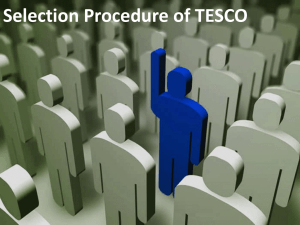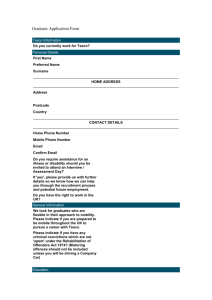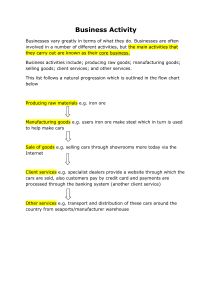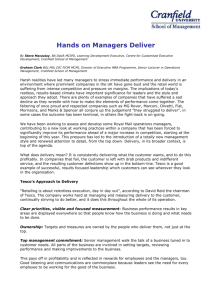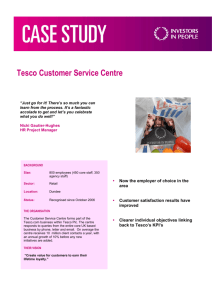PEST analysis - Work Related Learning
advertisement
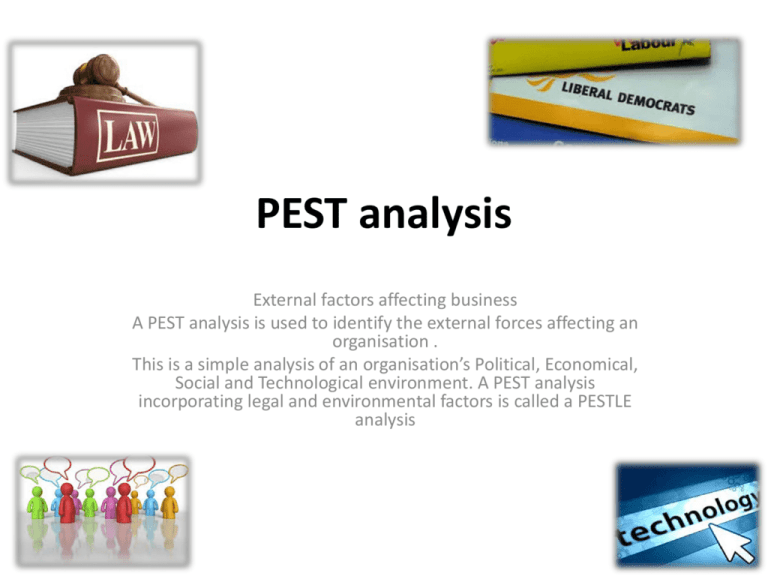
PEST analysis External factors affecting business A PEST analysis is used to identify the external forces affecting an organisation . This is a simple analysis of an organisation’s Political, Economical, Social and Technological environment. A PEST analysis incorporating legal and environmental factors is called a PESTLE analysis Political The first element of a PEST analysis is a study of political factors. Political factors influence organisations in many ways. Political factors can create advantages and opportunities for organisations. Conversely they can place obligations and duties on organisations. Political factors include the following types of instrument: Legislation such as the minimum wage or anti discrimination laws Voluntary codes and practices Market regulations Trade agreements, tariffs or restrictions Tax levies and tax breaks Type of government regime eg communist, democratic, dictatorship Non conformance with legislative obligations can lead to sanctions such as fines, adverse publicity and imprisonment. Ineffective voluntary codes and practices will often lead to governments introducing legislation to regulate the activities covered by the codes and practices. Political factors affecting Tesco Operating in a globalized environment with stores around the globe (Tesco now operates in six countries in Europe in addition to the UK; the Republic of Ireland, Hungary, Czech Republic, Slovakia, Turkey and Poland. It also operates in Asia: in South Korea, Thailand, Malaysia, Japan and Taiwan), Tesco’s performance is highly influenced by the political and legislative conditions of these countries, including the European Union (EU). For employment legislations, the government encourages retailers to provide a mix of job opportunities from flexible, lower-paid and locally-based jobs to highly-skilled, higher-paid and centrally-located jobs. Also to meet the demand from population categories such as students, working parents and senior citizens. Tesco understands that retailing has a great impact on jobs and people factors (new store developments are often seen as destroying other jobs in the retail sector as traditional stores go out of business or are forced to cut costs to compete), being an inherently local and labour-intensive sector. Tesco employs large numbers of; student, disabled and elderly workers, often paying them lower rates. In an industry with a typically high staff turnover, these workers offer a higher level of loyalty and therefore represent desirable employees. Economical The second element of a PEST analysis involves a study of economic factors. All businesses are affected by national and global economic factors. National and global interest rate and fiscal policy will be set around economic conditions. The climate of the economy dictates how consumers, suppliers and other organisational stakeholders such as suppliers and creditors behave within society. An economy undergoing recession will have high unemployment, low spending power and low stakeholder confidence. Conversely a “booming” or growing economy will have low unemployment, high spending power and high stakeholder confidence. A successful organisation will respond to economic conditions and stakeholder behaviour. Furthermore organisations will need to review the impact economic conditions are having on their competitors and respond accordingly. In this global business world organisations are affected by economies throughout the world and not just the countries in which they are based or operate from. For example: a global credit crunch originating in the USA contributed towards the credit crunch in the UK in 2007/08. Cheaper labour in developing countries affects the competitiveness of products from developed countries. An increase in interest rates in the USA will affect the share price of UK stocks or adverse weather conditions in India may affect the price of tea bought in an English café. A truly global player has to be aware of economic conditions across all borders and needs to ensure that it employs strategies that protect and promote its business through economic conditions throughout the world. Economical factors affecting Tesco Economic factors are of concern to Tesco, because they are likely to influence demand, costs, prices and profits. One of the most influential factors on the economy is high unemployment levels, which decreases the effective demand for many goods, adversely affecting the demand required to produce such goods. These economic factors are largely outside the control of the company, but their effects on performance and the marketing mix can be profound. Although international business is still growing, and is expected to contribute greater amounts to Tesco’s profits over the next few years, the company is still highly dependent on the UK market. Hence, Tesco would be badly affected by any slowdown in the UK food market and are exposed to market concentration risks. Social The third aspect of PEST focuses its attention on forces within society such as family, friends, colleagues, neighbours and the media. Social forces affect our attitudes, interests and opinions. These forces shape who we are as people, the way we behave and ultimately what we purchase. For example within the UK peoples attitudes are changing towards their diet and health. As a result the UK is seeing an increase in the number of people joining fitness clubs and a massive growth for the demand of organic food. Products such as Wii Fit attempt to deal with society’s concern, about children’s lack of exercise. Population changes also have a direct impact on organisations. Changes in the structure of a population will affect the supply and demand of goods and services within an economy. Falling birth rates will result in decreased demand and greater competition as the number of consumers fall. Conversely an increase in the global population and world food shortage predictions are currently leading to calls for greater investment in food production. Due to food shortages African countries such as Uganda are now reconsidering their rejection of genetically modified foods. In summary organisations must be able to offer products and services that aim to complement and benefit people’s lifestyle and behaviour. If organisations do not respond to changes in society they will lose market share and demand for their product or service. Social factors affecting Tesco Current trends indicate that British customers have moved towards ‘one-stop’ and ‘bulk’ shopping, which is due to a variety of social changes. Tesco have, therefore, increased the amount of non-food items available for sale. Demographic changes such as the aging population, an increase in female workers and a decline in home meal preparation mean that UK retailers are also focusing on added-value products and services. In addition, the focus is now towards; the ownlabel share of the business mix, the supply chain and other operational improvements, which can drive costs out of the business. National retailers are increasingly reticent to take on new suppliers (Clarke, Bennison and Guy,1994; Datamonitor Report, 2003). The type of goods and services demanded by consumers is a function of their social conditioning and their consequent attitudes and beliefs. Consumers are becoming more and more aware of health issues, and their attitudes towards food are constantly changing. One example of Tesco adapting its product mix is to accommodate an increased demand for organic products. Economical factors affecting Tesco Economic factors are of concern to Tesco, because they are likely to influence demand, costs, prices and profits. One of the most influential factors on the economy is high unemployment levels, which decreases the effective demand for many goods, adversely affecting the demand required to produce such goods. These economic factors are largely outside the control of the company, but their effects on performance and the marketing mix can be profound. Although international business is still growing, and is expected to contribute greater amounts to Tesco’s profits over the next few years, the company is still highly dependent on the UK market. Hence, Tesco would be badly affected by any slowdown in the UK food market and are exposed to market concentration risks. Economical factors affecting Tesco Economic factors are of concern to Tesco, because they are likely to influence demand, costs, prices and profits. One of the most influential factors on the economy is high unemployment levels, which decreases the effective demand for many goods, adversely affecting the demand required to produce such goods. These economic factors are largely outside the control of the company, but their effects on performance and the marketing mix can be profound. Although international business is still growing, and is expected to contribute greater amounts to Tesco’s profits over the next few years, the company is still highly dependent on the UK market. Hence, Tesco would be badly affected by any slowdown in the UK food market and are exposed to market concentration risks. Technological Unsurprisingly the fourth element of PEST is technology, as you are probably aware technological advances have greatly changed the manner in which businesses operate. Organisations use technology in many ways, they have 1. Technology infrastructure such as the internet and other information exchange systems including telephone 2. Technology systems incorporating a multitude of software which help them manage their business. 3. Technology hardware such as mobile phones, Blackberrys, laptops, desktops, Bluetooth devices, photocopiers and fax machines which transmit and record information. Technology has created a society which expects instant results. This technological revolution has increased the rate at which information is exchanged between stakeholders. A faster exchange of information can benefit businesses as they are able to react quickly to changes within their operating environment. However an ability to react quickly also creates extra pressure as businesses are expected to deliver on their promises within ever decreasing timescales.. For example the Internet is having a profound impact on the marketing mix strategy of organisations. Consumers can now shop 24 hours a day from their homes, work, Internet café’s and via 3G phones and 3G cards. Some employees have instant access to e-mails through Blackberrys but this can be a double edged sword, as studies have shown that this access can cause work to encroach on their personal time outside work. The pace of technological change is so fast that the average life of a computer chip is approximately 6 months. Technology is utilised by all age groups, children are exposed to technology from birth and a new generation of technology savvy pensioners known as “silver surfers” have emerged. Technology will continue to evolve and impact on consumer habits and expectations, organisations that ignore this fact face extinction. Technology factors affecting Tesco Technology is a major macro-environmental variable which has influenced the development of many of the Tesco products. The new technologies benefit both customers and the company: customer satisfaction rises because goods are readily available, services can become more personalised and shopping more convenient.The launch of the Efficient Consumer Response (ECR) initiative provided the shift that is now apparent in the management of food supply chains (Datamonitor Report, 2003). Tesco stores utilise the following technologies: • Wireless devices • Intelligent scale • Electronic shelf labelling • Self check-out machine • Radio Frequency Identification (RFID). The adoption of Electronic Point of Sale (EPoS), Electronic Funds Transfer Systems (EFTPoS) and electronic scanners have greatly improved the efficiency of distribution and stocking activities, with needs being communicated almost in real time to the supplier Environment In 2003, there has been increased pressure on many companies and managers to acknowledge their responsibility to society, and act in a way which benefits society overall. The major societal issue threatening food retailers has been environmental issues, a key area for companies to act in a socially responsible way. Hence, by recognizing this trend within the broad ethical stance, Tesco’s corporate social responsibility is concerned with the ways in which an organization exceeds the minimum obligations to stakeholders specified through regulation and corporate governance. In 2003 the government launched a new strategy for sustainable consumption and production to cut waste, reduce consumption of resources and minimise environmental damage. The latest legislation created a new tax on advertising highly processed and fatty foods. The so-called ‘fat tax’ directly affected the Tesco product ranges that have subsequently been adapted, affecting relationships with both suppliers and customers Legislative Factors Various government legislations and policies have a direct impact on the performance of Tesco. For instance, the Food Retailing Commission (FRC) suggested an enforceable Code of Practice should be set up banning many of the current practices, such as demanding payments from suppliers and changing agreed prices retrospectively or without notice. The presence of powerful competitors with established brands creates a threat of intense price wars and strong requirements for product differentiation. The government’s policies for monopoly controls and reduction of buyers’ power can limit entry to this sector with such controls as license requirements and limits on access to raw materials. In order to implement politically correct pricing policies, Tesco offers consumers a price reduction on fuel purchases based on the amount spent on groceries at its stores. While prices are lowered on promoted goods, prices elsewhere in the store are raised to compensate.
